The qualifying tournament for the 2011 World Cup took place in South Africa between April 1st and 19th 2009. Twelve teams battled it out for a total of four golden tickets to the top table tournament which was held in India and Bangladesh.
Group A saw holders Scotland joined by Ireland, Oman, Canada, Namibia and Uganda, while Group B had Afghanistan, Kenya, Netherlands, UAE, Bermuda and Denmark.
The format would see the top four from each group progress to a Super League phase, where they would play the four teams from the other group. The top two would then play in a final, while third and fourth would gain the other two qualification places.
The opening day saw a repeat of the 2005 final with Scotland and Ireland facing each other in Benoni. Scotland rallied from 68 for 5 to post 232 for 7 thanks to a brilliant unbeaten 121 from Neil McCallum. Ireland chased down their target with little fuss as skipper William Porterfield led from the front with 101, sharing a second wicket stand of 131 with Eoin Morgan (60).
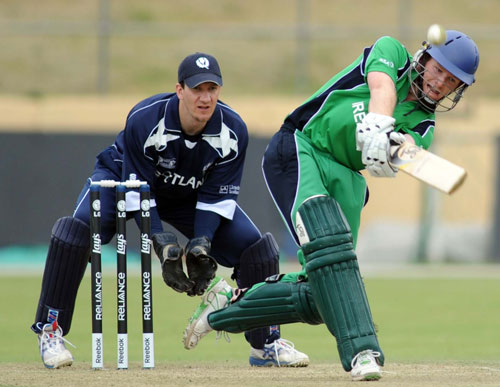 Ireland v Scotland: Eoin Morgan hits a six
Ireland v Scotland: Eoin Morgan hits a six
Sunil Dhaniram (101) was another centurion as Canada beat Oman by 103 runs despite a five wicket haul for Tariq Hussain. Uganda also stunned Namibia as they won the African derby by six runs as Roger Musaka’s half century proved crucial.
In Group B Ryan ten Doeschate hit 106 as he and Bas Zuiderent (64*) added 186 as The Netherlands chased 248 to beat Kenya by seven wickets. Also chasing successfully were Afghanistan who beat Denmark by five wickets – runs for Shahzad and Nabi-, and the UAE who beat Bermuda by four wickets.
Day two saw Afghanistan win again as runs for Nowroz Mangal and Karim Khan plus four wickets for Samiullah Shenwari saw them beat Bermuda comfortably. The Netherlands were also victorious as Alexei Kervezee hit 121 as they beat Denmark, for whom Michael Pedersen also made 121. Kenya’s Lameck Onyango took 6 for 14 as UAE were skittled for just 79, which proved no trouble as Maurice Ouma made 50 in a routine chase.
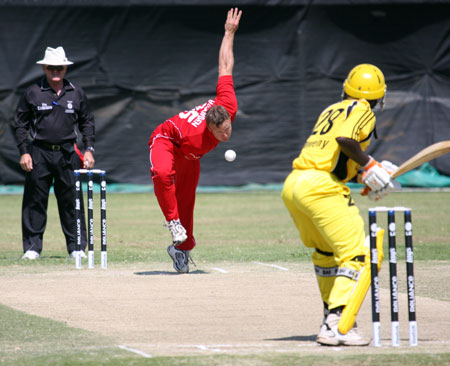 Henrik Hansen bowling in Denmark's victory over Uganda
Henrik Hansen bowling in Denmark's victory over Uganda
A fifth wicket stand of 174 between Kevin O’Brien (101) and Andy White (71*) was the catalyst for Ireland’s 116 run win over Oman – Regan West taking 5 for 26 for the Irish. Scotland bounced back with a 72-run win over Namibia thanks to back-to-back centuries from Neil McCallum. Geoff Barnett’s hundred made sure Canada beat Uganda by five wickets to also keep their winning start intact.
A day off for all was followed by the third round of fixtures and saw Ireland prove too strong for Uganda with Andy White taking 4 for 22 and Gary Wilson making 61. Scotland’s Kyle Coetzer hit 127 in a crucial nine-run win over Oman, with Jan Stander taking four wickets. John Davison clubbed 10 fours and 6 sixes in his 131 from 99 balls as Canada crushed Namibia by 141 runs.
Kenya brought Afghanistan down to earth with a 107-run win thanks primarily to Kennedy Otieno’s century, while Saqib Ali’s 78 helped UAE beat The Netherlands. Bermuda ran out convincing nine-wicket winners against Denmark with Rodney Trott taking four wickets and David Hemp making an undefeated 76.
The penultimate round of the group stages saw The Netherlands beat Afghanistan by five wickets with Daan van Bunger making an unbeaten 65 in the chase. David Hemp was again in the runs but his century for Bermuda was in a losing cause as fifties from Ouma, Steve Tikolo and Otieno saw Kenya win easily. Amjad Javed was in devastating form as he thumped 164 as UAE racked up 379 for 6 against Denmark, winning by 112 runs.
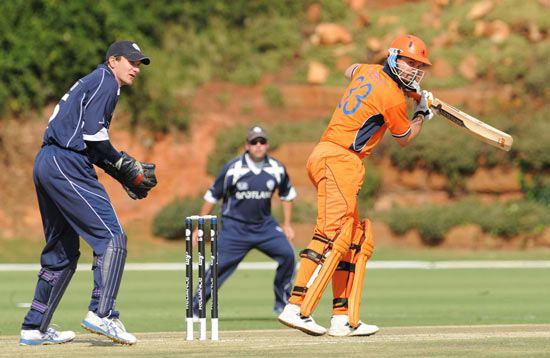 Bas Zuiderent batting for The Netherlands against Scotland
Bas Zuiderent batting for The Netherlands against Scotland
Three wickets for Umar Bhatti had Ireland in trouble at 42 for 4 as they replied to Canada’s 220, but unbeaten 80s from Eoin Morgan and Kevin O’Brien saw the pair add 181 to win by six wickets. Neil McCallum’s third century of the tournament ensured Scotland beat Uganda by 45 runs, while Namibia hammered Oman by 119 runs with Sarel Burger taking five wickets after fifties from Nicholas Scholtz, Gerrie Snyman and Craig Williams.
The final round of group games saw Canada thump Scotland by 148 runs, doing severe damage to their NRR and qualification hopes. Ashish Bagai made 87 in Canada’s 252 for 7, while the wickets were shared as Scotland limped to 104. Ireland ensured they carried full points into the next phase as William Porterfield and Niall O’Brien hit half centuries in a seven wicket win over Namibia. The bottom two played out a thriller as Oman chased 299 to beat Uganda by one wicket, denying them a place in the next round - Farhan Khan hitting 95 from just 49 balls.
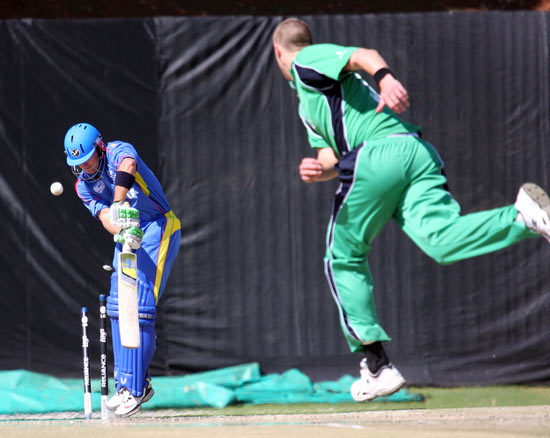 Ireland's Boyd Rankin bowls Craig Williams of Namibia
Ireland's Boyd Rankin bowls Craig Williams of Namibia
Kenya topped Group B beating Denmark by 9 wickets 0 Collins Obuya and Seren Waters both in the runs. The Netherlands finished second after a 63-run win against Bermuda despite 81 from Hemp, while UAE put a serious dent in Afghanistan’s qualification ambitions beating them by five wickets with Nithin Gopal making 81 and Saqib Ali 69.
The Super Eight phase started in dramatic fashion as Afghanistan stunned Ireland by 22 runs – Hamid Hassan taking five wickets in a MOM display as the Irish went from 186 for five to 196 all out. The defeat saw a very public falling out between Ireland Coach Phil Simmons and Eoin Morgan, who was keen to return to England to prepare for the county season.
 Ireland's Alex Cusack is stumped against Afghanistan
Ireland's Alex Cusack is stumped against Afghanistan
Scotland kept their hopes alive as 80 from Jan Stander and five wickets for John Blain helped them beat the Dutch by 26 runs, while in the other games four wickets for Henry Osinde saw Canada beat Kenya, while Namibia beat UAE by 61 runs thanks to fifties from Louis Burger and Nicholas Scholtz.
The next set of games saw a brilliant unbeaten hundred from Ryan ten Doeschate help The Netherlands to a two wicket win against Namibia, while Lameck Onyango took four wickets as Scotland made 154 chasing 178 against Kenya.
Ireland got back on track with an emphatic eight wicket win against UAE – Regan West taking three wickets and Gary Wilson making 49. Canada all but ended Afghan hopes of making the World Cup as Ian Billcliff (96*) and Ashish Bagai (68) added 148 as they chased 266 – Noor Ali earlier having made 122.
The penultimate round of games saw Ireland claim a World Cup slot as they chased 222 to beat The Netherlands by six wickets. Eoin Morgan hit a rapid 76 in what would prove to be his last game for the Irish, while skipper Porterfield top scored with 78. As the Irish were celebrating word filtered through that Afghanistan had beaten Scotland by 42 runs – Karim Khan making 92, while Kyle Coetzer’s 91 was in vain.
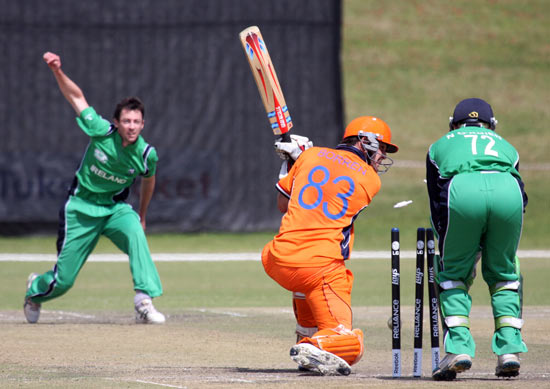 Ireland v The Netherlands: Peter Borren is bowled by Alex Cusack
Ireland v The Netherlands: Peter Borren is bowled by Alex Cusack
AJ Burger’s 125 helped Namibia to an emphatic 201 run over Kenya, while the UAE beat Canada by five wickets to ensure a nervous final round of matches in the race to join Ireland.
The final games in the Super Eight Phase saw Ireland chose to rest key players having already ensured a final berth, and they also opted to bat first in difficult conditions handing Kenya a lifeline which they duly took. Niall O’Brien made 59 in their 208 for 9, but that proved an easy target as Collins Obuya and Thomas Odoyo both hit half centuries in an unbroken fifth wicket stand of 113 to ensure a qualification slot.
The Netherlands and Canada gained the other two slots, with the Canadians earning second place despite losing to the Dutch – Mudassar Bukhari (84) and Alexei Kervezee (77) sharing a stand of 167 to all but seal their World Cup place.
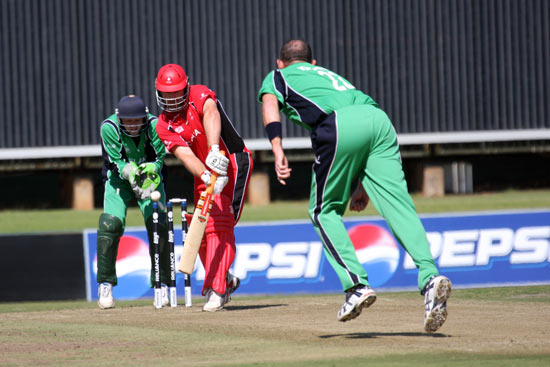 Ireland's Trent Johnston bowls Ian Billcliff of Canada in the Final
Ireland's Trent Johnston bowls Ian Billcliff of Canada in the Final
In the classification matches Ireland won the final with Trent Johnston taking five wickets and William Porterfield scoring a century in the nine-wicket win against Canada.
Third place went to The Netherlands who beat Kenya easily with Edgar Schiferli taking four wickets, plus half centuries for Daan van Bunge and Bas Zuiderent.
Afghanistan’s match against Scotland was their first ODI and they duly won it thanks to a fine all-round display highlighted by half centuries from Mohammed Nabi and Samiullah Shenwari, while Khurram Khan’s 124 helped UAE to seventh as they beat UAE.
Bermuda claimed ninth as David Hemp and Stephen Outerbridge hit centuries putting on a second wicket stand of 223 as they chased 353 to beat Uganda by eight wickets. Oman beat Denmark in the 11th place game, although both sides were relegated in the World Cricket League as a consequence of their placings.
Edgar Schiferli was named the Player of the Tournament, his 24 wickets at 17.38 the best in a tournament dominated by the bat.
David Hemp with 557 runs at 185 was the leading run scorer, ahead of William Porterfield (515 runs) and Alexei Kervezee (461), with the Scotland duo of Neil McCallum (452) and Kyle Coetzer (424) just behind.
 Ireland won the Final
Ireland won the Final
The CricketEurope team of the tournament was as follows:
For the opening combination it was impossible to go past the prolific Irish skipper William Porterfield, who also captains our side, and The Netherlands' Alexei Kervezee. They made 515 at an average of 57.22 and 461 at 51.22 respectively, and were named as the two near-misses for the ICC's overall Player of the Tournament award.
This means passing over the competition's overall leading run scorer, Bermuda's David Hemp, who made 557 at 185.67, but whose runs mainly came in the closing stages, against the weaker sides. Other openers who came into consideration were Afghanistan's Karim Khan, Scotland's Gavin Hamilton, and John Davison of Canada, who made 233 in five matches at 46.60 before he was forced to drop out through injury.
The Irish batting line-up was far and away the most powerful in the tournament, and we've gone for Eoin Morgan and the brothers Niall and Kevin O'Brien as numbers three to five in the batting. Niall, obviously, also takes the wicketkeeping berth, ahead of Canada's Ash Bagai and The Netherlands' Jeroen Smits, who had the largest number of victims with 18 catches and a stumping.
The specialist batsmen are completed by the inclusion of Neil McCallum of Scotland, whose 452 runs at 56.50 included three vital centuries; what would have happened to the Scots in the group phase had he not played those knocks scarcely bears thinking about.
Upper and middle order batsmen who staked a strong claim for inclusion were, apart from Bagai, Kyle Coetzer of Scotland, Ryan ten Doeschate of The Netherlands, Nowroz Mangal of Afghanistan, Saqib Ali of the UAE, and Bas Zuiderent of The Netherlands.
Our two all-rounders are Mohammad Nabi of Afghanistan, a classy batsman who picked up 10 wickets with his off-spin, and Gerrie Snyman of Namibia, with 338 runs at 37.56 and 13 wickets at 26.54.
Apart from Krugersdorp, the pitches in South Africa were hardly encouraging for spinners, and it's not surprising that it was hard to find slow bowlers who made much impression: two exceptions who deserves a mention are Rodney Trott of Bermuda, who took 14 wickets at a highly creditable average of 17.29, and Regan West, with 14 for Ireland at 22.93.
That leaves the seamers, and we've gone for Player of the Tournament Edgar Schiferli (The Netherlands), who broke the tournament record with 24 wickets at 17.38 and also contributed valuable runs on occasion, Ireland's Boyd Rankin (15 at 20.40), and Afghanistan's Hamid Hassan (18 at 22.22).
Again, there were several players who came into contention, including Lameck Onyango of Kenya, Rankin's opening partner Peter Connell, John Blain of Scotland (who claimed 17 victims at 20.18 in seven matches after coming back from injury), Louis Klazinga of Namibia, and, bowling at a more modest pace, Craig Wright of Scotland and Khurram Chauhan of Canada.
- William Porterfield (Ireland, captain)
- Alexei Kervezee (The Netherlands)
- Eoin Morgan (Ireland)
- Niall O'Brien (Ireland, wicketkeeper)
- Kevin O'Brien (Ireland)
- Neil McCallum (Scotland)
- Mohammad Nabi (Afghanistan)
- Gerrie Snyman (Namibia)
- Edgar Schiferli (The Netherlands)
- Boyd Rankin (Ireland)
- Hamid Hassan (Afghanistan)

